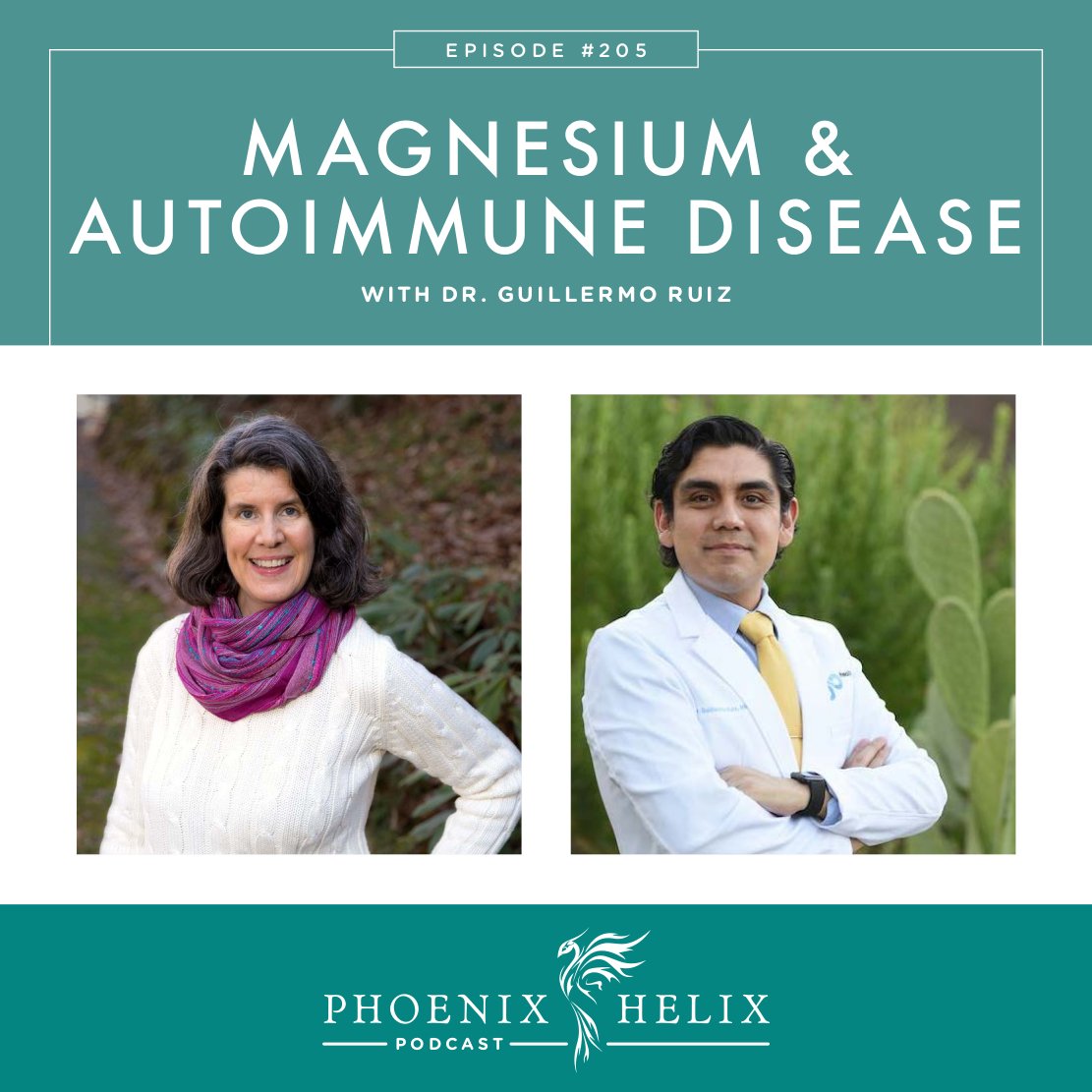Magnesium: A Vital Nutrient
Food is the foundation of autoimmune health, but there are a few nutrients that are difficult to get through food, and magnesium is one of those. For that reason, it’s a supplement many doctors recommend, and many autoimmune warriors swear by. So, I’m dedicating today’s podcast to magnesium. Why is it so essential? What roles does it play in our body? And how might magnesium (or magnesium deficiency) impact autoimmune health? My guest today is Dr. Guillermo Ruiz, a naturopathic doctor, researcher, and autoimmune expert.
Listen to the Show
- Subscribe to my podcast through your favorite podcast app: iTunes, Stitcher, Google, TuneIn, Spotify, Amazon, etc.
- You can also listen to the episode right here through the player below, and if you subscribe to my newsletter you’ll get notified of future episodes.
Podcast: Play in new window | Download
Show Notes
- Intro (0:00)
- Thank You to Our Podcast Sponsor – Hashimoto’s: Solving the Puzzle (2:20)
- This online course is designed by Dr. Datis Kharrazian, a world-renowned expert in thyroid health. He revolutionized the functional medicine approach to Hashimoto’s by being the first to address the autoimmune component. He’s helped thousands of patients reach remission, and this course is designed to help you achieve that same goal.
- Hashimoto’s is one of the most common autoimmune diseases, affecting 14 million people in the United States alone and millions more worldwide. Unfortunately, it takes an average of 10 years to receive a diagnosis. And many patients are never told their thyroid problem is autoimmune. While thyroid medication can help, it rarely restores health completely. This course gives you the tools to reclaim health and vitality again.
- The online video lessons are divided into 14 modules, and teach you how to:
- Order the right lab tests.
- Know which thyroid hormone medication is best for you.
- Find your unique dietary, lifestyle, chemical, and pathogen triggers.
- Customize a Hashimoto’s diet.
- And learn the best supplements to take for your unique circumstances.
- Dr. Kharrazian is offering my listeners a special discount. Save $100 with the code PHOENIX. That’s a 30% discount off the course! He also has free 1-hour webinar where you can sample his teaching style. Learn more at Drknews.com/phoenix.
- Meet Dr. Ruiz (4:05)
- Dr. Guillermo Ruiz is a naturopathic doctor. He came to this career through a combination of personal and professional inspiration.
- He had some health issues himself (obesity, pain, fatigue, heartburn) that resolved when he discovered the paleo diet and lifestyle in 2010. Prior to that, he had tried other types of diets that didn’t work. His success with paleo inspired a deep interest in an ancestral/evolutionary approach to health.
- Professionally, he had a fulfilling job as an EMT in a pediatric trauma center where he saw miracles happen within conventional medicine. However, he never saw those kids again and wished he could guide them in maintaining their health going forward. One child in particular was very influential. She came to the trauma center at 9 years old with a urinary tract infection caused by glucose levels so high that her kidneys couldn’t filter it out. She was part of the childhood diabetes epidemic in the United States, brought on by the modern processed food diet and sedentary lifestyle.
- Dr. Ruiz chose naturopathy because he wanted to help people support their health holistically, and he wanted a medical practice that allowed him to take time with patients. He chose endocrinology as his specialty because hormones are central to so many aspects of health, including diabetes (like the child he treated at the trauma center) and autoimmune disease. Simultaneously, he maintains respect for conventional medicine because sometimes it’s needed. He has an integrated medicine approach.
- Roles Magnesium Plays in Our Bodies (11:14)
- In his clinical practice, Dr. Ruiz often reduces the number of supplements patients take. But magnesium is one that he often recommends and it’s the only supplement that he takes regularly himself.
- Mitochondrial Health: Magnesium is a cofactor in over 300 mitochondrial processes. These are the powerhouses of our cells bodywide, which is why magnesium is essential to all aspects of human health. Dr. Terry Wahls is a leader in the paleo autoimmune community, and her first book was called Minding My Mitochondria. She’s a strong advocate for cellular health because that’s the foundation of all other health.
- Fibromyalgia: A lot of fibromyalgia issues are mitochondrial issues, and a lot of mitochondrial issues are caused by magnesium deficiency. Widespread pain, digestive issues, even gut infections can be downstream effects of the cellular mitochondria not working as they should.
- Bone Health: While calcium is often the most talked about nutrient for bone health, low magnesium levels also increase the risk of osteoporosis. This is especially important to know for people with autoimmune disease because autoimmune disease also increases the risk of osteoporosis. (Resource podcast: Ep. 142 – Osteoporosis and Autoimmune Disease.)
- Muscle Cramps: Calcium helps with muscle contraction. Magnesium helps with muscle relaxation. If they are out of balance and your diet includes more calcium than magnesium, muscle cramps and tension can result. This also effects organ muscles, not just skeletal muscles. When Dr. Ruiz worked in the hospitals, if a patient came in with a severe asthma attack, they would try albuterol and epinephrine first, and if that didn’t dilate the bronchia, they would do an IV of magnesium sulfate which always worked.
- Heart Health: This is one of the most strongly researched areas, and magnesium is shown to be protective against high blood pressure, stroke, and cardiovascular disease. Since autoimmune disease increases the risk for cardiovascular disease, this is helpful information to have. (Resource podcast: Ep. 173 – Cardiac Risk and Autoimmune Disease.)
- Mental Health: There is research showing a connection between low magnesium levels and a variety of mental disorders. It’s also one of the supplements recommended in my podcast: Ep. 146 – Anxiety and Autoimmune Disease.
- Menopause and Perimenopause: I have a podcast dedicated to menopause and autoimmune disease, because the hormone fluctuations can impact autoimmune activity. In that podcast, magnesium was one of the recommended interventions.
- Blood Sugar Regulation: Magnesium supports stable blood sugar, which is essential to autoimmune health. (Resource podcast: Blood Sugar and Autoimmune Disease).
- Vitamin D Metabolism: Vitamin D can’t be metabolized without sufficient magnesium, and vitamin D is an important immune system regulator.
- Inflammation: Magnesium deficiency can cause or contribute to chronic inflammation.
- Nutrient Absorption: Autoimmune diseases that attack the GI tract can interfere with nutrient absorption, which is why magnesium deficiency is especially common for people with IBD.
- Thank You to Our Podcast Sponsor – ShopAIP (24:32)
- Today I want to highlight the Phoenix Helix Bundle. It contains some of my favorite ShopAIP products, and is a great way to sample their offerings. You get three of my favorite quick and delicious proteins: Wild Planet’s Wild Sockeye Salmon, Wild Zora’s Mediterranean Lamb Bar, and Chomps Sea Salt Beef Stick. Two of my favorite AIP sauces from KC Naturals: their Marinara Pasta Sauce and Primal Cherry BBQ Sauce. Two of my favorite AIP spices: Redmond’s Real Salt & Primal Palate’s Breakfast Blend. And two crunchy snacks for when you have that craving: Sweetpotato Awesome dehydrated sweetpotato slices and Bare Fruit’s Crunchy Organic Fuji & Red Apple Chips.
- ShopAIP is an online store dedicated to the Paleo Autoimmune Protocol. With hundreds of items for the elimination phase of the AIP, and products labeled by reintroduction category as well. You can find protein bars, sauces and condiments, AIP-friendly spices, cooking and baking ingredients, waffle and pancake mix, delicious snacks, and more.
- If you’re a first-time customer, use the code PHOENIX for 10% off your order. Purchase here.
- Magnesium is Beneficial but Not a Cure-All (26:13)
- Magnesium is an essential nutrient for our body, but it’s important to remember that there are other potential root causes to health problems. It’s not always a magnesium deficiency. A more holistic approach looks at all factors of health.
- For example, magnesium is helpful for reducing hypertension (high blood pressure), but what’s the root cause behind the hypertension? Is there a diet or lifestyle factor that can be addressed to truly eliminate the problem?
- Dr. Ruiz shared an example from his own life. He used Natural Calm (magnesium citrate) for years to address chronic constipation. But when he was diagnosed with Hashimoto’s in 2020 and addressed his thyroid, the constipation improved dramatically and he needed much less magnesium supplementation.
- Why It’s Hard to Get Magnesium Through Food (29:58)
- Modern farming methods have depleted magnesium from the soil, so foods that used to contain it in large quantities no longer do. Climate change is lowering levels even further.
- There are food lists of high magnesium foods, but they may not contain the advertised levels of magnesium. AIP foods on those lists include spinach and other greens, avocado, banana, salmon, halibut, raisins, chicken and beef. And some paleo foods (AIP reintros) include pumpkin seeds, almonds, cashews and dark chocolate.
- One example of the challenge of getting magnesium through food is spinach: 1/2 cup of boiled spinach is supposed to contain 78mg of magnesium. The recommended daily intake (RDA) of magnesium is 300-400 mg. So, it’s not actually high in relation to the amount we need, and a lot of that magnesium ends up in the boiled water. And that’s assuming the spinach actually does contain 78mg, which may not be true given the problems with soil depletion.
- In addition, digestive problems can interfere with the absorption of magnesium in our diet as well.
- Can We Test Our Magnesium Levels? (33:24)
- Testing is challenging because most magnesium is inside the cells, so blood serum levels don’t accurately reflect the amount of magnesium in the body.
- Dr. Ruiz has a specialty test that measures both intracellular and extracellular magnesium, which is more accurate. However, he doesn’t test magnesium levels often. Instead, he recommends a supplement self-experiment. Since so many people are deficient, he will have people supplement with magnesium to see if it improves their symptoms.
- Recommended Daily Dose (34:20)
- Disclaimer: Dr. Ruiz is providing information today as education, not medical advice. Even though oral magnesium is generally considered safe, always consult with your healthcare team before conducting supplement experiments.
- The recommended daily intake of magnesium for adults is 310-320 for women and 400-420 for men. This is the minimum amount. Dr. Ruiz feels it’s generally safe to go above that and experiment to find the best dose for you, and that’s true for both men and women.
- The reason oral magnesium is a generally safe supplement experiment is that your body will excrete excess magnesium through loose stools before letting the levels in your body get dangerously high. In fact, this is one way to determine your optimal level: start with 300 mg and see if that relieves your symptoms. If it doesn’t, slowly increase your dose until your stools become loose, and then reduce your dose slightly to set your optimal level. (However, if diarrhea is one of your autoimmune symptoms, avoid this test. Instead, stick with the RDA and choose a form of magnesium that’s better tolerated for people who experience diarrhea. We’ll be sharing options below.)
- IV magnesium is different and should only be administered under a doctor’s care. You can overdose with IV magnesium and cause dangerous side effects like dangerously low blood pressure, slowing of the heart, etc.
- Medication Interactions (38:50)
- Supplements can interact with certain medications, which is why it’s important to talk with your healthcare team before doing supplement experiments. You might need to take the supplement at a different time of day than your medication. Your doctor or pharmacist can guide you. Some of the medications that interact with magnesium include antibiotics, bisphosphonates, high blood pressure medication, muscle relaxants, diuretics, blood thinners, antacids, gabapentin, ketamine, some diabetes medications, some Parkinson’s medications, and others.
- Thank You to Our Podcast Sponsor – Autoimmune Strong (40:07)
- Have you heard of Autoimmune Strong yet? It’s the ONLY exercise program designed FOR people living with chronic pain, BY someone living with chronic pain.
- Andrea Wool, the personal trainer behind Autoimmune Strong, is an autoimmune warrior herself. She struggled for years trying to figure out how to exercise in a way that made her feel good, but all the fitness programs she tried ended up causing flare-ups and exhaustion instead. She knew there had to be a better way. So she studied, experimented, and created a program that works FOR people with autoimmune disease.
- The goal of Autoimmune Strong is to help you gain strength, flexibility, and mobility, without causing exercise induced flare-ups or post-exercise exhaustion.
- All the exercises can be done at home – no gym necessary. And there is a ton of support built in all along the way, with access to expert coaches, monthly zoom calls with Andrea, and an amazing membership community filled with other people just like you.
- You can try Autoimmune Strong for free! Everyone gets a 7-day free trial. Andrea is also giving my listeners an extra discount of 10% off your first month with the code PHOENIX.
- We all deserve to feel healthy and strong in our bodies. You deserve a life with fewer flares and more joy. Learn more at GetAutoimmuneStrong.com.
- Different Types of Magnesium Supplements (41:57)
- While it’s fine to target different types of magnesium for specific purposes, Dr. Ruiz said the foundational goal of all magnesium supplementation is to restore mitochondrial health which in turn supports health bodywide. Most types of magnesium support that goal, so don’t geek out too much on the different types, and feel free to experiment and find the type that works best for your body and your budget.
- Magnesium citrate is Dr. Ruiz’s personal favorite. It’s inexpensive and it has the added benefit of helping people who struggle with constipation.
- Magnesium citramate is a different form of magnesium that is better tolerated by anyone prone to diarrhea. Note: if you have diarrhea, begin your supplement experiment with low doses and slowly titrate up only as tolerated.
- Magnesium glycinate may be especially beneficial to gut health, and this is Eileen’s favorite form of magnesium for a good night’s sleep. It’s also one that is often well tolerated by people who are prone to diarrhea.
- Magnesium taurate may be especially beneficial for cardiovascular health.
- Magnesium threonate has been shown to be absorbed better across the blood-brain barrier, so may be beneficial for headaches, brain fog, etc.
- For muscle tension, you might benefit from combining an oral magnesium supplement with Epsom salt baths.
- Electrolytes are a great option if you’re on a low-carb diet, are an athlete, or use saunas regularly, because all three of those things deplete electrolytes. Electrolytes contain magnesium along with sodium and potassium which are all essential minerals that our body needs.
- The only type of magnesium Dr. Ruiz recommends against is magnesium oxide. It’s often included in lower-quality supplements and falsely advertised as beneficial. Avoid this form of magnesium.
- Recommended Brands (49:09)
- Pure Encapsulations makes great supplements. They don’t use a lot of additives and are generally well tolerated by people with autoimmune disease. The downside is that they’re now owned by Nestle, and Nestle has some very unethical corporate policies.
- Thorne is another brand Dr. Ruiz recommends. They use a few more fillers than Pure Encapsulations, but they are high-quality supplements.
- Natural Calm is Dr. Ruiz’s favorite brand of magnesium citrate and the one he personally takes. It’s a powder, so you can easily titrate the dose up or down.
- Biotics Research makes a product called Mg-Zyme – it’s small, low-dose pills that are also easy to titrate.
- LMNT is his favorite brand of electrolytes.
- Outro (54:06)
- Dr. Guillermo Ruiz has a telehealth medical practice and he is accepting new patients. He offers a free 15 minute consultation and works with people around the world.
- Eileen (your podcast host) is the author of multiple books, written to help people thrive with autoimmune disease. Learn more on the Books Page.
- If you like this podcast, follow or subscribe through your favorite podcast app. You can also subscribe to Eileen’s biweekly newsletter.
- Check out the entire archive of podcast episodes.
You May Also Be Interested In
Spreading the Word
If you like the podcast, please leave a positive review in iTunes. It would mean the world to me, and also helps others find the podcast. Here are some quick instructions using your iPhone:
- If you are already subscribed to my podcast: (1) Click the purple podcast icon. (2) At the bottom of the screen, click Library. (3) At the top of the screen, click Shows. (4) Click the Phoenix Helix podcast image. (5) Scroll down the page, and you’ll see Ratings and Reviews. Scroll down a little bit more and click on Write a Review. This will bring up the review screen. Tap 5 stars (if you love the podcast), and then click in the title box, and it will bring up the keyboard. Enter a title and short review. (6) Click Send in the upper right corner. (7) Thank you! Positive reviews give the podcast a higher search ranking in iTunes, helping people find it and letting them know it’s a quality podcast and worth their time to listen.
- If you haven’t subscribed to my podcast: (1) Click the purple podcast icon. (2) In the lower right corner, click the magnifying class. (3) Type Phoenix Helix in the search box. (4) Click the podcast cover in the Show list. (5) If you’d like to subscribe, click the + sign at the top of the screen. (6) To write a review, scroll down the page, and you’ll see Ratings and Reviews. Scroll down a little bit more and click on Write a Review. This will bring up the review screen. Tap 5 stars (if you love the podcast), and then click in the title box, and it will bring up the keyboard. Enter a title and short review. (7) Click Send in the upper right corner. (8) Thank you! Positive reviews give the podcast a higher search ranking in iTunes, helping people find it and letting them know it’s a quality podcast and worth their time to listen.









Perfect timing for me – I’ve been trying to decide about adding a Magnesium supplement to my diet and became overwhelmed with the sheer number and variety of available products. Just ordered the Calm powder. Thank you!!!
You’re so welcome. I love it when the right information comes along at the right time.